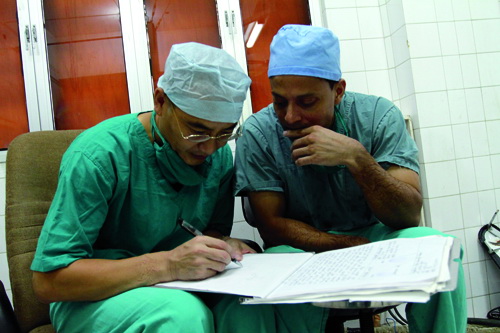|
|

|
|
China-Africa cooperation in the health field booming (COURTESY PHOTO) |
When Zhong Risheng, a 30-something Chinese doctor, took a trip to Comoros, an island country off the coast of Africa, in mid-July, 2012, he ended up having a very different experience from his first trip to the continent in 2004. On that visit, Zhong spent two years in Niger broadening his horizons and gaining life experience. But on his more recent trip he hoped to help African people with health issues. In addition to his work in Africa, he had another important responsibility in his life to consider: This time he would be leaving his two-year-old son in China.
"I told myself, on the other side of the earth, many children need my help to get rid of disease so that they can continue to live healthy lives," said Zhong. "Then, I no longer feel regret [about being away from my son]," he added.
Zhong is just one of the 21,729 Chinese medical personnel who have made the journey to Africa over the past 50 years to help treat the continent's sick and diseased.
Fifty years ago, on April 6, 1963, China's first medical team, made up of 20 Chinese doctors, set off for Algeria with a strong international humanitarian spirit and sense of responsibility, marking the beginning of China's international medical assistance program.
True friendship
In January 1963, China was the first country to answer the call of the Algerian Government for medical assistance after the success of the liberation movement led to the withdrawal of French medical workers. The move to provide help, said Lucy Chen, Executive Deputy Director of the Institute for Global Health at Peking University, was made despite the fact that China itself was suffering from the shortage of medical professionals and resources. That China has been sending medical teams to Africa for the last half century, despite its own difficulties, demonstrates that the Sino-African partnership is based on genuine friendship and strongly rebuts Western media's criticism that China's involvement in Africa is purely for the purpose of exploiting natural resources, said Chen.
Currently, the Chinese Government pairs up Chinese provinces and municipalities with African countries and dispatches medical teams accordingly, making this form of aid and cooperation more sustainable and targeted.
According to statistics from China's National Health and Family Planning Commission (NHFPC), over 21,000 medical personnel have been sent to Africa over the past 50 years, treating more than 200 million patients. At present, around 1,000 Chinese health professionals are working in 42 African countries.
"Chinese doctors work hard and are highly efficient. They are not afraid of hardship and work in areas that are short of doctors and medicines, and are most welcomed by our people," said Sasara Chasala George, the Republic of Botswana's Ambassador to China. Julius Kambarage Nyerere, the first Tanzanian President, also praised Chinese medical workers, saying he trusted them and they had both experience and a strong sense of responsibility.
Over the past 50 years, African governments have awarded medals to 962 Chinese medical team members, according to the NHFPC.
Expanded cooperation
China accelerated its engagement with Africa after the establishment of the Forum on China-Africa Cooperation (FOCAC) in 2000, under which China strengthened its cooperation with African countries in the health sector.
From 2007 to 2009, China assisted African countries in building 30 hospitals, provided 300 million yuan ($48.7 million) in grants for anti-malaria drugs and built 30 malaria prevention and treatment centers. From 2010 to 2012, China provided 500 million yuan ($81.2 million) worth of medical and anti-malaria equipment to those hospitals and centers.
China's medical assistance to Africa has also undergone great changes over the past decade. More and more government departments, non-governmental organizations (NGOs) and Chinese companies have joined in offering health assistance to Africa, according to Dr. Ren Minghui, Director General of the Department of International Cooperation at China's NHFPC.
"The areas of cooperation have also been expanded from sending medical teams to training local medical personnel; from building hospitals and providing free medical facilities and medication to conducting joint medical research," he told ChinAfrica.
In recent years, new technology has also been integrated into China's infrastructure construction projects in Africa. Portable container hospitals and clinics, which were developed by Chinese researchers at the Low Cost Health Program Center at the Chinese Academy of Sciences' Shenzhen Institute of Advanced Technology, will soon be ready for use in Cameroon or Namibia, and there are plans to send clinics to Egypt, Kenya, South Africa and Tanzania by the end of this year, according to the London-based Science and Development Network (scidev.net).
The low cost and mobility of fully sustainable container hospitals and clinics make them very suitable for rural areas that lack basic health equipment, said Wuliu Jiaqi, the training director for this project.
|